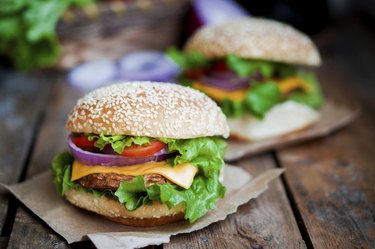
Protein and a certain amount of fats help with your energy needs but too much can disrupt your sleeping patterns. Excess amounts of protein and fats can also cause weight gain, especially if you are inactive. Extra pounds can lead to problems with insomnia. A low-fat diet that meets your protein needs along with regular physical activity avoids sleeping difficulties.
Saturated Fats
Video of the Day
Many protein foods, including meat, poultry, fish and dairy products, contain saturated fats. Protein may also block the activity of serotonin, a neurotransmitter that helps you relax and sleep. Protein foods help provide you with energy and mental alertness but too much protein and fats from protein can keep you awake. Insomnia may also result from eating these and other foods late at night.
Video of the Day
Energized
Protein releases amino acids into your bloodstream after digestion. A high amount of protein promotes the amino acid tyrosine. Tyrosine enters the bloodstream and travels to the brain, where it increases the production of neurotransmitters, including dopamine, epinephrine and norepinephrine. These brain chemicals boost your energy levels. Protein foods help athletes and others who seek energy during the day for work or school-related activities.
Dietary Changes
Too much protein intake, however, may have a rebound effect and interfere with sleep, especially if you eat protein foods later in the day or at night. If you suspect protein and fats are keeping you awake, change your eating patterns. Consume lean meats with all visible fat trimmed off and skinless poultry. Switch to low-fat or nonfat dairy products. Add more fruit, vegetables and grains, such as whole grain bread and pasta, high-fiber cereal, rice and nuts to your diet. Grains contain carbohydrates, which help the amino acid tryptophan reach the brain. Tryptophan converts to serotonin to help you relax and sleep.
High-Fat Foods
High-fat foods can cause gas, heartburn or indigestion. These digestive problems overwork your stomach and cause difficulties when you try to rest or sleep. Heartburn, a burning or painful feeling in the upper chest and throat, arises from acid reflux. Fatty foods contribute to acid reflux, causing a backflow into the esophagus after eating and during sleep. If you experience heartburn in the middle of the night, high-fat foods or eating too much late at night may be the cause. High-fat chocolate and sugary foods raise blood sugar levels. This increases your energy, making it difficult to sleep.